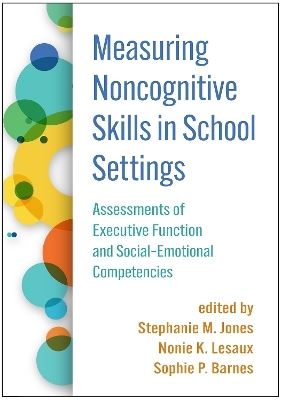
Measuring Noncognitive Skills in School Settings
Guilford Press (Verlag)
978-1-4625-4867-5 (ISBN)
Stephanie M. Jones, PhD, is the Gerald S. Lesser Professor in Child Development and Education at the Harvard Graduate School of Education, where she also serves as Director of the Ecological Approaches to Social and Emotional Learning Lab. Dr. Jones’s research focuses on the effects of poverty and exposure to violence on children's social, emotional, and behavioral development. Her recent work addresses the impact of preschool- and elementary-level social and emotional learning interventions on behavioral and academic outcomes and classroom practices, as well as new curriculum development, implementation, and testing. With Nonie K. Lesaux, Dr. Jones is codirector of the Saul Zaentz Early Education Initiative and coprincipal investigator of the Early Learning Study at Harvard. She recently served as a member of the Council of Distinguished Scientists for the Aspen National Commission on Social, Emotional, and Academic Development. Nonie K. Lesaux, PhD, is the Juliana W. and William Foss Thompson Professor of Education and Society at the Harvard Graduate School of Education. Her developmental and experimental research with school-age children and youth investigates language, reading, and social–emotional development; classroom quality and academic growth; and strategies for accelerating language and reading comprehension. With Stephanie M. Jones, Dr. Lesaux is also codirector of the Saul Zaentz Early Education Initiative and co-principal investigator of the Early Learning Study at Harvard. She is a recipient of the William T. Grant Scholars Award and the Presidential Early Career Award for Scientists and Engineers. Dr. Lesaux has served on the Institute of Medicine and National Research Council’s Committee on the Science of Children Birth to Age 8. Sophie P. Barnes, EdM, is a doctoral candidate in the Human Development, Learning and Teaching concentration at the Harvard Graduate School of Education. Her research centers on understanding the setting- and individual-level mechanisms that support children’s social, emotional, and behavioral skill development in school contexts, with a focus on executive function and self-regulation. She is also interested in adding nuance and precision to the measurement of social and emotional learning (SEL) and partnering with schools and districts to develop effective assessment plans. Prior to beginning her doctoral studies, Ms. Barnes worked in the EASEL Lab led by Stephanie M. Jones on a number of evaluations of school-based interventions that target children’s SEL growth and development, as well as research and translational writing projects.
Foreword, Timothy P. Shriver
Introduction, Stephanie M. Jones, Nonie K. Lesaux, & Sophie P. Barnes
I. From Physiology to Character Virtues: Creative, Contextually Relevant Approaches to Capturing Individual Functioning
1. Direct Assessment of Students’ Executive Functions and Motivation in Elementary Classroom Settings, Jelena Obradović & Lily Steyer
2. The Fidget Spinner Effect: Social and Emotional Assessment and the Healthy Evolution of the Social and Emotional Learning Field, Clark McKown
3. Defining and Measuring Young Children’s Social–Emotional Development in Global Contexts, Dana Charles McCoy
4. Stress Physiology in Context: On the Measurement and Meaning of Autonomic Nervous System and Hypothalamic–Pituitary–Adrenal-Axis Functioning, Keira B. Leneman & Daniel Berry
5. Measuring Noncognitive Skills Using Ambulatory Psychophysiology, Oliver Saunders Wilder & Richard Palumbo
6. Conceptualizing and Measuring Character Virtues and Related Attributes Using the Bornstein Specificity Principle: A Relational Developmental Systems-Based Perspective, Paul A. Chase, Dian Yu, Jonathan M. Tirrell, Mary H. Buckingham, Patricia Gansert, Yerin Park, Carolina Goncalves, & Richard M. Lerner
II. In the Classroom: Setting- and Behavior-Focused Approaches
7. Behavior and Discipline: Direct Behavioral Indicators for Use in the Classroom, Sandra M. Chafouleas & Amy M. Briesch
8. Using Behavior Incident Data for Program and Classroom Decision Making: Addressing Issues of Equity and Exclusionary Discipline Responses, Lise Fox, Myrna Veguilla, & Mary Louise Hemmeter
9. Defining and Measuring Quality of Early Childhood Education in Low- and Middle-Income Countries, Abbie Raikes
10. Capturing the Social and Emotional Classroom: Using Setting-Level Measures to Drive Improvements in Teaching and Learning, Sophie P. Barnes, Rachel M. Abenavoli, & Stephanie M. Jones
III. Population-Level Tools to Guide Practice and Policy
11. Cross-Cutting Issues for Measuring Social–Emotional Competency in Context: General Opportunities and Challenges with an Illustration of the Washoe County School District SEC Assessments, Rachel A. Gordon & Laura A. Davidson
12. Measuring and Monitoring Children’s Social and Emotional Competence and Well-Being in Schools, Families, and Communities at the Population Level: The Middle Years Development Instrument, Kimberly A. Schonert-Reichl
IV. Cross-Cutting Methodological and Policy Issues
13. Cross-Cutting Methodological Considerations for Measuring and Assessing Noncognitive Skills, Laura S. Hamilton
14. Thriving Matters: Policies and Assessment That Foster Equity and Thriving, Jessica Newman, David Osher, Deborah Moroney, & Samantha Neiman
Index
| Erscheinungsdatum | 07.04.2022 |
|---|---|
| Verlagsort | New York |
| Sprache | englisch |
| Maße | 152 x 229 mm |
| Gewicht | 800 g |
| Themenwelt | Geisteswissenschaften ► Psychologie ► Pädagogische Psychologie |
| Sozialwissenschaften ► Pädagogik | |
| ISBN-10 | 1-4625-4867-9 / 1462548679 |
| ISBN-13 | 978-1-4625-4867-5 / 9781462548675 |
| Zustand | Neuware |
| Haben Sie eine Frage zum Produkt? |
aus dem Bereich


